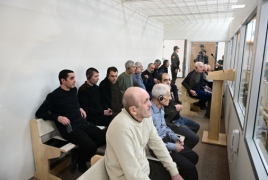
Leading legal experts gathered in Vienna to spotlight Azerbaijan’s judicial crisis, citing political prosecutions, repression of lawyers, and persecution of ethnic Armenians.
On May 5, 2025, a discussion was held in Vienna within the framework of the OSCE conference on human rights, focusing on the topic “How the absence of human rights affects Azerbaijan’s judicial system.” The event was organized by the International and Comparative Law Center and the International Bar Association, in cooperation with the Armenian Center for Human Rights and Justice, Artsakh Union, and Rights Without Borders NGO.
The discussion brought together prominent international legal experts to highlight ongoing human rights violations in Azerbaijan and their weakening effect on the judiciary and rule of law. Special attention was given to methods of pressure against professional lawyers, the use of courts as tools of persecution, and the targeted prosecution of ethnic Armenian prisoners, according to Aravot.
Ayn Macdonald, representing the International Bar Association’s Human Rights Institute, opened the event by outlining the deepening crisis in Azerbaijan’s judiciary. He expressed concern over unwarranted executive influence and deliberate interference in court proceedings, which hinder courts from fulfilling their constitutional functions.
“Azerbaijan’s repressive practices extend beyond human rights defenders to include lawyers handling politically sensitive cases,” Macdonald stated.
He specifically addressed the situation of ethnic Armenians convicted on political grounds and false charges, stressing that a climate of fear has deprived them of adequate legal representation—an essential component of a fair trial.
Siranush Sahakyan, head of the International and Comparative Law Center, emphasized that justice in Azerbaijan has become a secondary concern. She noted repeated denial of access to clients, obstructing defense efforts, and presented evidence of state-supported institutional Armenophobia prevalent in Azerbaijan.
Sahakyan underscored that several Armenian detainees had suffered cruel treatment, even in the presence of state-appointed lawyers or with their complicity. She warned that Azerbaijan continuously violates international humanitarian law, pointing out that some judges handling these cases had previously made politically motivated rulings, raising serious doubts about their independence and impartiality.
Philippe Kalfaïan, also representing the International and Comparative Law Center, detailed systemic pressure on human rights defenders in Azerbaijan. He cited rulings by the European Court of Human Rights that confirm the political nature of such persecution. Kalfaïan stated that impartial legal defense for Armenian detainees is currently impossible, as “Azerbaijani lawyers openly admit that trial outcomes are pre-decided by authorities.” He urged OSCE member states to activate the Moscow Mechanism to properly investigate violations of ethnic Armenians’ rights in Azerbaijan.
Anna Melikyan, who moderated the discussion, highlighted the country’s growing authoritarianism, citing data from Amnesty International, Human Rights Watch, Freedom House, and the UN Committee Against Torture. She pointed to intensified repression since November 2024, including arrests of anti-war activists and social media users, as well as cross-border crackdowns aimed at silencing dissent.
Speakers and participants called on international institutions and governments to take immediate, coordinated action to uphold justice, legal accountability, and human dignity in Azerbaijan.

